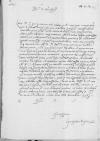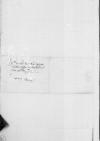Litterae Dominationis Tuae per Diego Gracián de Alderete (*ca. 1494 – †1586), humanist, translator from Greek and Latin into Castilian, became engaged to Dantiscus' daughter Juana on 1537-06-30, and married her in 1538; scribe and secretary to Emperor Charles V, later secretary to King Philip II of Spain (SKOLIMOWSKA 2000; CE, vol. 2, p. 122)⌊GratianumDiego Gracián de Alderete (*ca. 1494 – †1586), humanist, translator from Greek and Latin into Castilian, became engaged to Dantiscus' daughter Juana on 1537-06-30, and married her in 1538; scribe and secretary to Emperor Charles V, later secretary to King Philip II of Spain (SKOLIMOWSKA 2000; CE, vol. 2, p. 122)⌋ mihi redditae, quibus meis super coniugio ipsius cum Juana Dantisca (*1527 – †1601), daughter of Ioannes Dantiscus and Isabel Delgada; wife of Diego Gracián de Alderete (SKOLIMOWSKA 2004, p. 52; LLAMAS 1995; LLAMAS 1999; LLAMAS 2001; LLAMAS, SKOLIMOWSKA; MELGAR, 37, ...)⌊Ioanna DantiscaJuana Dantisca (*1527 – †1601), daughter of Ioannes Dantiscus and Isabel Delgada; wife of Diego Gracián de Alderete (SKOLIMOWSKA 2004, p. 52; LLAMAS 1995; LLAMAS 1999; LLAMAS 2001; LLAMAS, SKOLIMOWSKA; MELGAR, 37, ...)⌋ filia tua ad te datis satisfacis,
tametsi multis nominibus fuere gratae, duabus tamen de causis fuere longe gratiores. Altera, quod tuae essent meique memoriam apud te adhuc vigere cognovissem, altera, quod munificentiam et favorem tuum Diego Gracián de Alderete (*ca. 1494 – †1586), humanist, translator from Greek and Latin into Castilian, became engaged to Dantiscus' daughter Juana on 1537-06-30, and married her in 1538; scribe and secretary to Emperor Charles V, later secretary to King Philip II of Spain (SKOLIMOWSKA 2000; CE, vol. 2, p. 122)⌊GratianoDiego Gracián de Alderete (*ca. 1494 – †1586), humanist, translator from Greek and Latin into Castilian, became engaged to Dantiscus' daughter Juana on 1537-06-30, and married her in 1538; scribe and secretary to Emperor Charles V, later secretary to King Philip II of Spain (SKOLIMOWSKA 2000; CE, vol. 2, p. 122)⌋, ubi matrimonium legitime contraxisse accepisses, ingenue pollicebaris. Mihi enim, qui ipsum neque immerito amo atque Dominationem Tuam Reverendissimam (uti par est) colo, nil accidere poterat gratius, quam erga Juana Dantisca (*1527 – †1601), daughter of Ioannes Dantiscus and Isabel Delgada; wife of Diego Gracián de Alderete (SKOLIMOWSKA 2004, p. 52; LLAMAS 1995; LLAMAS 1999; LLAMAS 2001; LLAMAS, SKOLIMOWSKA; MELGAR, 37, ...)⌊filiam tuamJuana Dantisca (*1527 – †1601), daughter of Ioannes Dantiscus and Isabel Delgada; wife of Diego Gracián de Alderete (SKOLIMOWSKA 2004, p. 52; LLAMAS 1995; LLAMAS 1999; LLAMAS 2001; LLAMAS, SKOLIMOWSKA; MELGAR, 37, ...)⌋ liberalem et ingenuum nec minus legitimum Diego Gracián de Alderete (*ca. 1494 – †1586), humanist, translator from Greek and Latin into Castilian, became engaged to Dantiscus' daughter Juana on 1537-06-30, and married her in 1538; scribe and secretary to Emperor Charles V, later secretary to King Philip II of Spain (SKOLIMOWSKA 2000; CE, vol. 2, p. 122)⌊GratianiDiego Gracián de Alderete (*ca. 1494 – †1586), humanist, translator from Greek and Latin into Castilian, became engaged to Dantiscus' daughter Juana on 1537-06-30, and married her in 1538; scribe and secretary to Emperor Charles V, later secretary to King Philip II of Spain (SKOLIMOWSKA 2000; CE, vol. 2, p. 122)⌋ amorem et tuae liberalitatis et erga utrumque paternae pietatis specimen contemplari.
Cum vero ipsi, acceptis tuis litteris, nihil fuerit potius, quam iussis tuis obtemperare ac liberalis et optimi viri officium, ut desiderari amplius nihil posset, praestare, reliquum est Dominationi Tuae et genero et filiae, quo commodius matrimonii onus sufferre queant, adesse eosque sua innata munificentia iuvare ac fovere, ne ambo, qui se tuae fidei crediderunt, spe tam iuste concepta frustrentur et Diego Gracián de Alderete (*ca. 1494 – †1586), humanist, translator from Greek and Latin into Castilian, became engaged to Dantiscus' daughter Juana on 1537-06-30, and married her in 1538; scribe and secretary to Emperor Charles V, later secretary to King Philip II of Spain (SKOLIMOWSKA 2000; CE, vol. 2, p. 122)⌊GratianusDiego Gracián de Alderete (*ca. 1494 – †1586), humanist, translator from Greek and Latin into Castilian, became engaged to Dantiscus' daughter Juana on 1537-06-30, and married her in 1538; scribe and secretary to Emperor Charles V, later secretary to King Philip II of Spain (SKOLIMOWSKA 2000; CE, vol. 2, p. 122)⌋, qui in matris connubiis et Juana Dantisca (*1527 – †1601), daughter of Ioannes Dantiscus and Isabel Delgada; wife of Diego Gracián de Alderete (SKOLIMOWSKA 2004, p. 52; LLAMAS 1995; LLAMAS 1999; LLAMAS 2001; LLAMAS, SKOLIMOWSKA; MELGAR, 37, ...)⌊filiae tuaeJuana Dantisca (*1527 – †1601), daughter of Ioannes Dantiscus and Isabel Delgada; wife of Diego Gracián de Alderete (SKOLIMOWSKA 2004, p. 52; LLAMAS 1995; LLAMAS 1999; LLAMAS 2001; LLAMAS, SKOLIMOWSKA; MELGAR, 37, ...)⌋ iocalibus non modicam pecuniarum summam consumpsit, inopia prematur, quod et tua dignitate et sua virtute atque eruditione esset indignissimum. Faciet in hoc Reverendissima Dominatio Tua rem non solum se dignam, sed etiam paternae pietati debitam, omnium opinionem consonam et amicis summopere gratam, uti latius ab Johan Weze (*1490 – †1548), secretary to King Christian II of Denmark; in 1522 nominated Archbishop of Lund; in 1527 was banished from Denmark as Christian II's secretary, and joined the service of Emperor Charles V as his diplomat, 1537-1548 Bishop of Constance (WHALEY, p. 314)⌊archiepiscopo LundensiJohan Weze (*1490 – †1548), secretary to King Christian II of Denmark; in 1522 nominated Archbishop of Lund; in 1527 was banished from Denmark as Christian II's secretary, and joined the service of Emperor Charles V as his diplomat, 1537-1548 Bishop of Constance (WHALEY, p. 314)⌋ verbo vel litteris latius accipiet.
Valeat felicissime Dominatio Tua, cui me humiliter commendo.


 UUB, H. 154, f. 188v
UUB, H. 154, f. 188v